To advance your career with a unique blend of scientific and industrial skills, you might consider a masters in biotechnology.

This degree program will prepare you to study the natural world and derive new technologies or products from it. Biotechnology is an innovative field with applications in pharmaceuticals, agriculture, defense, and other industries.
Editorial Listing ShortCode:
In the coursework for a Master of Biotechnology, you’ll come across fascinating ideas, explore the latest developments in this field, and prepare for a variety of interesting career opportunities.
Online Masters in Biotechnology Programs

Biotechnology master’s degree students study molecular biology and cell biology. Other topics studied could include:
- Business leadership
- Data management and visualization
- Genes
- Pharmaceutical manufacturing
- Neurobiology
- Proteins
- Scientific ethics
- Viruses
Some programs focus almost entirely on scientific studies. Others incorporate business-related classes to prepare graduates for management positions. You may have concentration options such as enterprise management, agricultural biotechnology, and medical technology. Some schools allow you to further specialize by taking classes from multiple concentration tracks.
As a science program, biotechnology master’s degrees typically include lab components. Sometimes, there are ways to do the labs from home so that your studies can be 100% online. Other schools may have you come to campus for short periods to focus on hands-on lab experiences.
Editorial Listing ShortCode:
Your masters degree in biotechnology may require you to write a thesis before graduation. If not, you may do a capstone research project or participate in a practicum experience instead. This degree program can help prepare you for a career as a scientific researcher. These professionals may work for a company that focuses on food production, medication, healthcare technology, biodefense, or environmental protection.
This role may encompass aspects of physics or chemistry in addition to biology. This degree program is relevant for business careers too. Some graduates go on to provide leadership in manufacturing companies or research firms. Some people who earn master’s degrees in this field want to continue their education with a PhD, such as a PhD in Biology online or on campus, or even a professional doctorate. That could lead to additional research and leadership opportunities.
Common Biotechnology Master’s Specializations
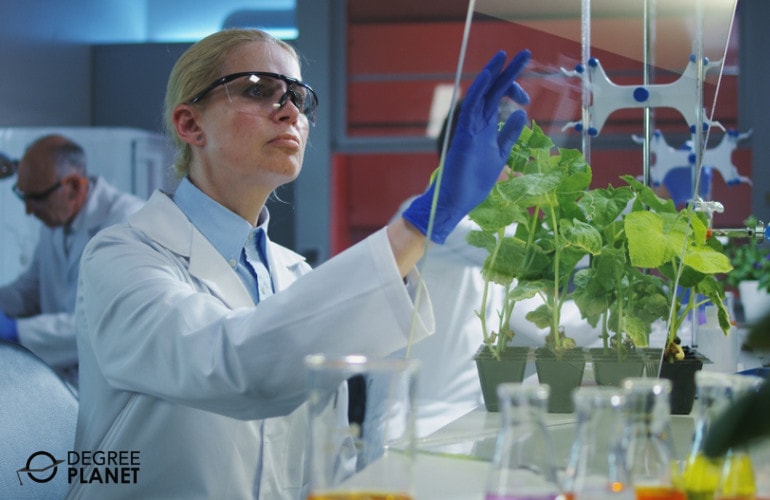
Biotechnology is a booming field that’s relevant for many industries. You may want to select a specialization for your master’s degree that will help prepare you for a certain line of work. Here are some common biotechnology concentrations:
- Agriculture. As you study agritech, you may explore biotechnology applications for improving plant growth, animal development, environmental care, and food production.
- Enterprise and Entrepreneurship. With this specialization, you can get ready for leadership roles as you study innovation, project management, marketing, and other business principles.
- Manufacturing. As you study the process of turning biotechnology ideas into useful products, you’ll also discuss regulatory compliance, supply chains, and quality control.
- Molecular Biology. As you develop your expertise in nucleic acids, proteins, and chromosomes, you’ll consider how these concepts can be applied in drug development and other industries.
- Pharmaceutical Science. In this track, you may study the business side of drug development as well as the experimental techniques, analytical skills, and technical processes that are involved.
This is just a small sampling of the degree concentrations available at various schools, so you may have a wide variety of options to choose from when you start your college search.
Biotechnology Careers & Salaries
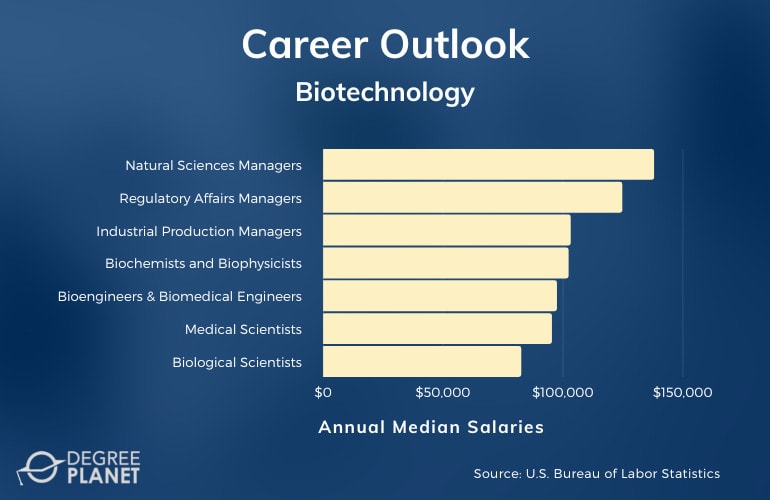
For those working in biotechnology fields with a bachelor’s degree, technician roles—such as biological technician or bioinformatics technician—are the most likely job options. Once you earn a master’s degree, your career prospects may increase.
Biotechnology experts work in a variety of fields. They use their technical know-how and their scientific expertise to solve problems and develop products. Potential science jobs include being a biochemist, a biophysicist, or a biologist. These professionals might work for a research firm, a manufacturing company, or a university.
According to the Bureau of Labor Statistics, here are some career paths related to the study of biotechnology.
| Careers | Annual Median Salaries |
| Natural Sciences Managers | $137,900 |
| Regulatory Affairs Managers (Included in Managers, All Other) | $124,650 |
| Industrial Production Managers | $103,150 |
| Biochemists and Biophysicists | $102,270 |
| Bioengineers and Biomedical Engineers | $97,410 |
| Medical Scientists | $95,310 |
| Biological Scientists (All Other) | $82,530 |
| Postsecondary Teachers | $79,640 |
| Bioinformatics Technicians (Included in Mathematical Science Jobs, All Other) | $62,460 |
| Biological Technicians | $48,140 |
These are potential job categories, but hiring qualifications vary among employers. Some jobs may require a doctoral degree or extensive experience. Focus areas for your scientific endeavors could include medicine, environmental protection, agriculture, or food production.
A masters could also help you qualify for management opportunities. Those in leadership roles might oversee a production facility or a scientific research team. They could also be in charge of ensuring that an organization follows government regulations.
Editorial Listing ShortCode:
Getting your master’s degree in biotechnology could lead to doctoral studies. Some doctoral professionals become college professors or medical scientists.
Master of Science in Biotechnology Curriculum & Courses
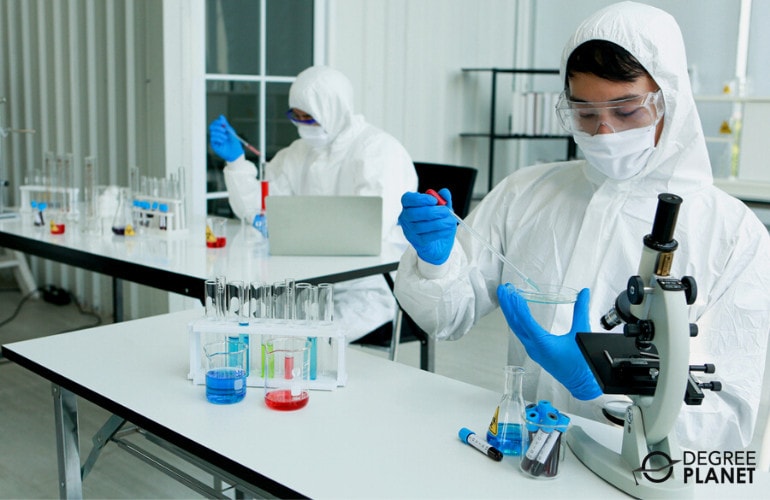
Biotechnology masters programs often require between 30 and 40 hours of coursework. Class offerings vary among schools and concentrations, but your curriculum may include classes like the ones listed here:
- Biotechnology Principles: This class will serve as an introduction to your program and will survey many of the graduate-level topics that you’ll study.
- Bioterrorism: In this course, you’ll explore the idea of biological warfare and consider how communities can respond to the threat.
- Business of Biotechnology: You’ll study how biotechnology practices fit into various industries, and you’ll also discuss the implications for research, funding, product development, and marketing.
- Cell Biology: A course on cell biology may cover topics related to genes, proteins, and organelles.
- Data Management: Those interested in biostatistics will need to learn techniques for working with large data sets.
- Experimental Methodology: This course teaches you how to design biotechnology experiments and analyze your findings.
- Laboratory Preparation: You may have a one-credit class that surveys lab practices before beginning a full biotechnology lab course.
- Microbiology: In one or more classes, you may study microscopic organisms as well as the challenges and opportunities they present for biotechnologists.
- Organizational Leadership: For those interested in the management side of biotechnology, a course on business leadership will be a valuable addition to your curriculum.
- Regulatory Practices: You’ll learn about regulations that surround product development, especially for food and medicines, and you’ll discuss safety and quality control measures.
Your program may also include a thesis, a capstone project, or a practicum.
Master in Biotechnology Admissions Requirements

Biotechnology studies can be rigorous, so a graduate program may have high standards for admission. The required application materials may include:
- College transcripts. Schools may look for evidence of prerequisite courses or a minimum GPA.
- Letters of reference. These may be from professional or academic supervisors.
- Personal statement. Your personal statement can outline your interest in the biotechnology program.
- Resume or curriculum vitae. Programs often want a record of your work experience.
- GRE or GMAT scores. A growing number of schools no longer these.
While most biotechnology graduate programs don’t require a specific undergraduate major, you may be required to complete certain science courses before applying.
Biotech Masters Programs Accreditation
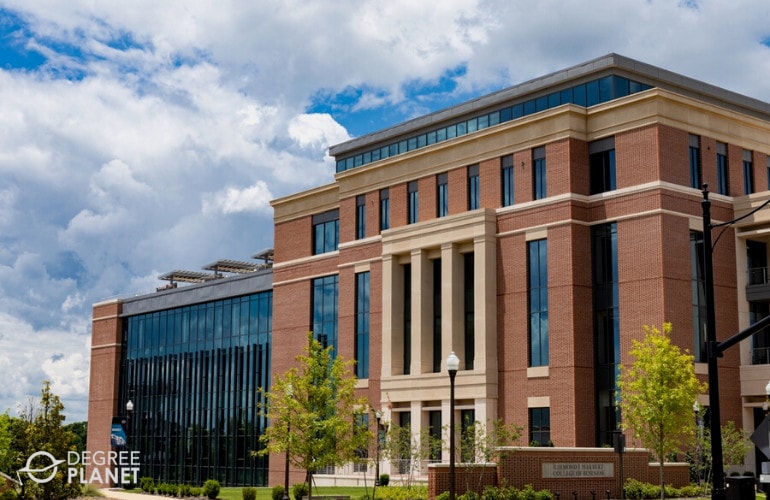
When you select a school for your M.S. in Biotechnology, it’s beneficial to choose one with regional accreditation. Regionally accredited colleges are widely recognized as reputable institutions.
Other colleges often look favorably on coursework from regionally accredited colleges. If you decided to transfer schools mid-program, your previous credits may be accepted. Earning a master’s from a regionally accredited school could also help you qualify for admission to a reputable doctoral program.
Editorial Listing ShortCode:
Scientific employers appreciate a regionally accredited education, too. Getting your masters degree from a regionally accredited college could be an essential requirement for securing lucrative positions in this industry.
Financial Aid and Scholarships

Paying out of pocket for a master’s degree in biotechnology can be a challenge, but various forms of financial aid are available to students who qualify.
You could start by filling out the Free Application for Federal Student Aid (FAFSA). This document is instrumental in determining whether you qualify for state or federal loans. Most graduate students aren’t eligible for grants, but there may be some exceptions.
Scholarships and fellowships are also beneficial. You may apply for these awards directly through your school or through an outside organization. Employer funding could also help reduce your school costs, especially if you currently work in a scientific field
Is Biotechnology a Good Career?
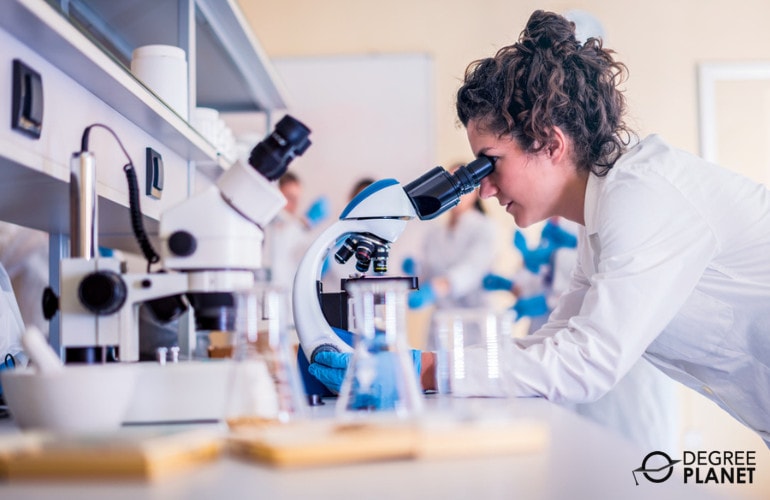
Yes, biotechnology is a good career for many professionals. According to the Bureau of Labor Statistics, biological scientists often earn between $48,260 and $133,830 each year. Natural science managers tend to have an annual salary between $75,040 and $208,000.
Biotechnology scientists, often known as biotechnologists, can work in industries like food processing, environmental protection, and medicine manufacturing. People with this degree can also work in related fields, such as biochemistry, biophysics, and bioengineering. A master’s degree can also help professionals qualify for management roles or doctoral studies.
What Can You Do with a Masters in Biotechnology Degree?
The leadership skills you gain in a masters degree program could help prepare you for scientific or manufacturing leadership positions. Graduates could pursue work as regulatory compliance managers, science managers, or production managers.
If you’d rather do hands-on work in the lab, you might be called a biotechnologist, a biologist, or a biochemist. According to the Bureau of Labor Statistics, biological scientists often work for research organizations, medical laboratories, drug manufacturing companies, and consulting firms.
What Do Biotechnologists Do?
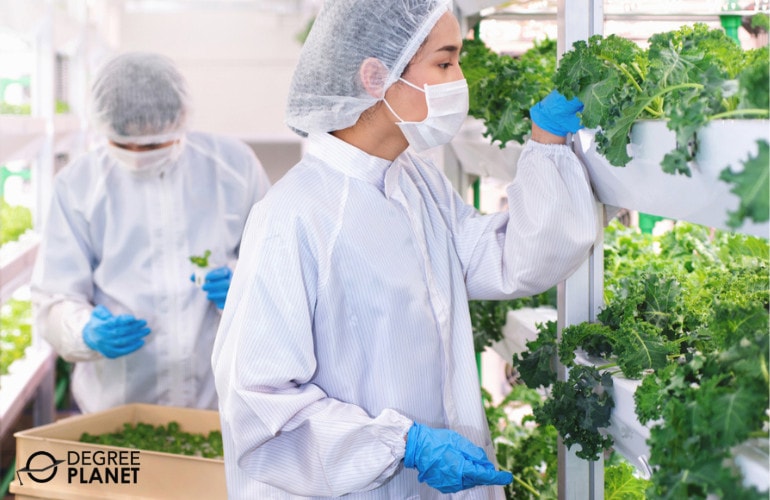
Biotechnologists are scientists who work in the biotechnology industry. They often work in lab settings for employers such as research firms, pharmaceutical companies, and environmental agencies.
Biotechnologists are involved with studying the structures and processes of organisms in order to develop breakthroughs in medicine, food production, biodefense, and other industries. Their everyday responsibilities may include running experiments, overseeing manufacturing processes, or ensuring regulatory compliance.
Beneficial skills for biotechnologists include organization, scientific understanding, and accuracy in the lab. It also helps to be a creative thinker and a good communicator.
How Long Does It Take to Get a Biotechnology Masters Online?

A masters generally takes 1 to 2 years to complete. Taking year-round, online classes may allow you to reduce the overall length of your studies. For instance, you may be able to complete a 36 credit biotechnology degree in 1 year with full-time, year-round study.
Editorial Listing ShortCode:
Online programs that last only 1 year may not include a thesis component. This is true for other degree programs, such as a master’s in genetics online or a masters in biomedical informatics online, as well. A thesis component will often add to your time to completion. Part-time enrollment is an option at some colleges, but it may take you longer to earn your degree.
What’s the Difference Between an MS in Biotechnology vs. Bioengineering?
Both biotechnology and bioengineering involve innovations and developments with the potential to improve people’s lives. Here are some ways that they differ.
| Biotechnology | Bioengineering |
|
|
While there are key differences, the work of these two fields often overlaps.
What’s the Difference Between a Masters vs. MBA in Biotechnology?
Most biotechnology programs are Master of Science (MS) degrees, but some are Master of Business Administration (MBA) degrees.
| Masters in Biotechnology | MBA in Biotechnology |
|
|
Some schools offer joint programs that allow you to earn both an MS and an MBA at the same time.
Is a Masters in Biotechnology Worth It?
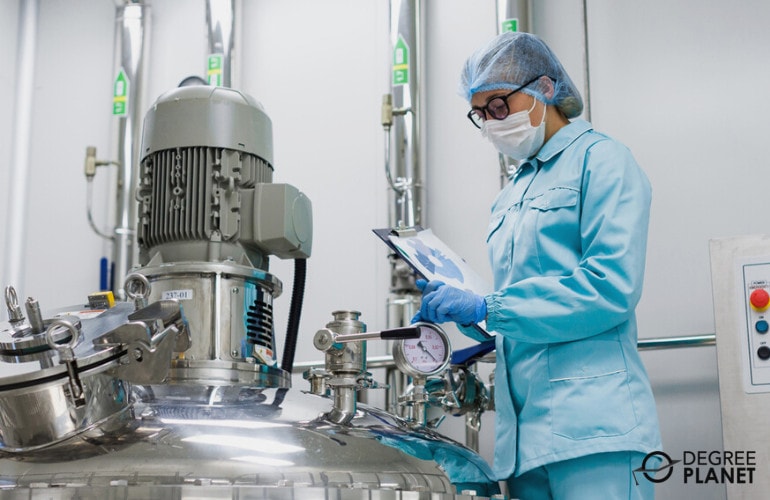
Yes, a masters in biotechnology is worth it for many students. According to the Bureau of Labor Statistics, jobs in science are growing at an 8% rate over the next ten years, and some jobs related to biotechnology are experiencing even faster growth.
Editorial Listing ShortCode:
For example, employment for medical scientists is expected to grow by 17% over the same period. Biotechnology is also a field that makes a difference. Whether you’re involved in agricultural production, drug development, or another sector, your work might help improve life and health for many people.
Universities Offering Online Masters in Biotechnology Degree Program
Methodology: The following school list is in alphabetical order. To be included, a college or university must be regionally accredited and offer degree programs online or in a hybrid format.

American University offers a Master of Science in Biotechnology. Students can choose from four tracks: Bioinformatics, Biotechnology Management, Drug Discovery, or Biodefense. This research-oriented program requires the completion of 30 credit hours of coursework. Full-time students can typically finish in 16 months, though students may attend the program part-time. Classes are available in the evenings and online.
American University is accredited by the Middle States Commission on Higher Education.

Duquesne University offers an MS in Biotechnology that is designed for students planning to pursue industry careers and those who want to eventually earn PhDs. The curriculum aims to develop scientific knowledge and leadership and management skills. The program uses a combination of online and in-person learning.
Duquesne University is accredited by the Middle States Commission on Higher Education.
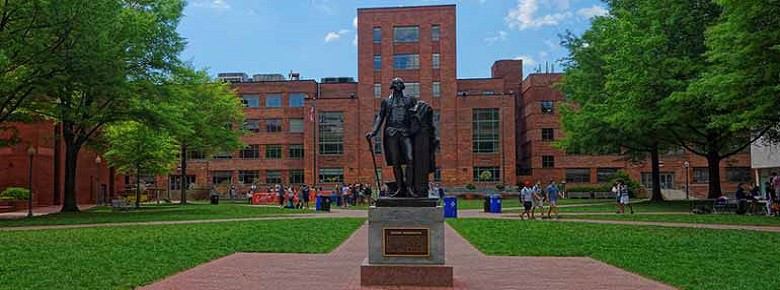
George Washington University offers an online program for an MSHS in Molecular Diagnostic Science. The 35 credit program usually takes 2 years to complete. Graduates are eligible to take the ASCP Technologist in Molecular Biology certification exam. GWU’s online courses are asynchronous but provide discussion boards so students can interact with each other.
The George Washington University is accredited by the Middle States Association of Colleges and Schools.

Harvard University offers an online program for a Master’s in Biotechnology through its extension school. Most students of the program work full-time and take one or two courses each semester. They typically have prior work experience in the field. The program requires a total of 12 courses.
Harvard University is accredited by the New England Commission of Higher Education.

Johns Hopkins University offers an MS in Biotechnology that can be completed on campus and online. The program typically takes 1 to 3 years to complete. Six optional concentrations are available. They are Regulatory Affairs, Regenerative and Stem Cell Technologies, Molecular Targets and Drug Discovery, Biotechnology Enterprise, Bioinformatics, and Biodefense.
The Johns Hopkins University is accredited by the Middle States Commission on Higher Education.

Morehouse School of Medicine offers a Master of Science in Biotechnology from Morehouse School of Medicine online. The program requires the completion of 35 credit hours of coursework and can typically be finished in 12 months. Courses are 8 weeks long and include Biomedical Data Science and Statistics, Critical Thinking and Communication, Cell Biology, and more.
Morehouse School of Medicine is accredited by the Southern Association of Colleges and Schools Commission on Colleges.

Mount Saint Mary’s University offers a Master of Science in Biotechnology and Management. Classes can be taken part-time or full-time, and the program is intended for working adults. The program requires the completion of twelve courses that are each 8 weeks long. Students can typically finish in 1 to 2 years. Courses are available on campus and online.
Mount Saint Mary’s University is accredited and reaffirmed for ten years by the Western Association of Schools and Colleges.
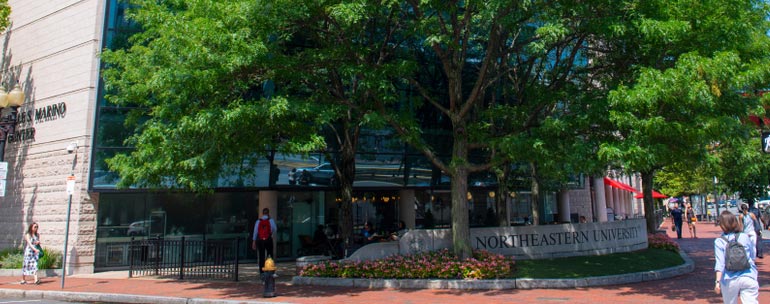
Northeastern University’s Master of Science in Biotechnology can be earned fully online. Multiple concentration options are available, but students are not required to declare a concentration. Certain concentrations require a 2 week residency in Boston. Classes can be taken full-time or part-time. The degree can typically be earned in 2 to 3 years.
Northeastern University is accredited by the New England Commission of Higher Education.
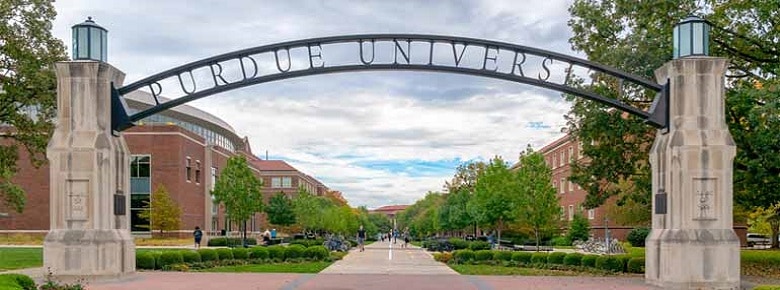
Purdue University offers a hybrid program for an MS in Biotechnology Innovation and Regulatory Science. Most coursework can be completed online, but students are required to come to campus for three weekends each semester. The program consists of 30 credit hours of coursework, which most students complete across four semesters. Applicants are required to have a bachelor’s degree in biology or a related field.
Purdue University is accredited by The Higher Learning Commission of the North Central Association of Colleges and Schools.

Texas Woman’s University offers a Professional Science Master’s in Biotechnology. The program uses a combination of online instruction and face-to-face evening classes. It requires the completion of 30 credit hours and can typically be finished in 1 to 2 years. Students in the program are given opportunities to receive hands-on lab instruction using state-of-the-art equipment and internships with TWU’s industry partners.
Texas Woman’s University is accredited by the Southern Association of Colleges and Schools Commission on Colleges.
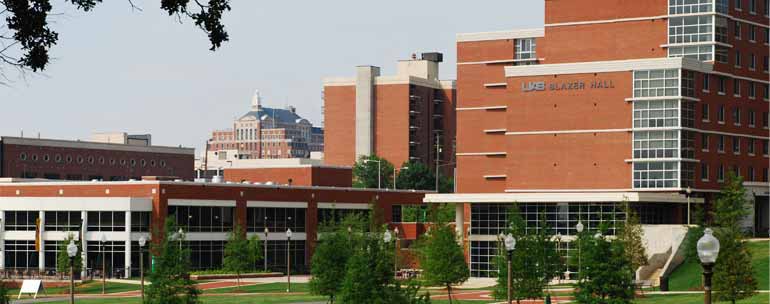
The University of Alabama—Birmingham offers a MS in Biotechnology. The full degree program is available online and on campus. Courses include Principles of Biotechnology – Nucleic Acid Technology, Research Design and Statistics, Applications of Biochemistry in Biotechnology, and more. Students are also required to complete an internship worth 2 credits.
The University of Alabama at Birmingham is accredited by the Southern Association of Colleges and Schools Commission on Colleges.

The University of Houston offers an online program for a Master of Science in Engineering Technology – Biotechnology. It aims to prepare students for research and leadership roles in biomedical fields. To graduate, students can choose to complete either a thesis or a project.
The University of Houston is accredited by the Southern Association of Colleges and Schools Commission on Colleges.
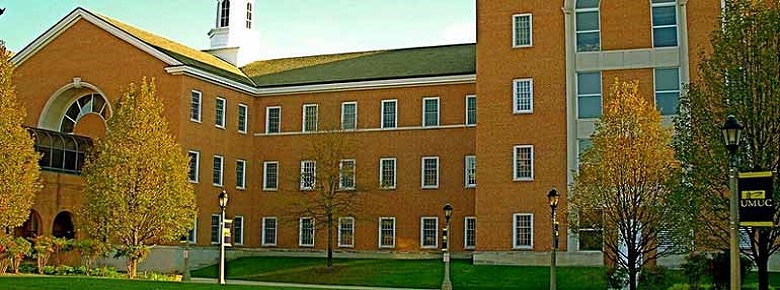
The University of Maryland Global Campus enables students to earn a Master’s in Biotechnology online. Some courses are also available in a hybrid format. Students can choose from four specializations: Bioinformatics, Biosecurity and Biodefense, Biotechnology Management, or Biotechnology Regulatory Affairs.
University of Maryland Global Campus is accredited by the Middle States Commission on Higher Education.

The University of Wisconsin—Whitewater offers an online program for a Master of Science in Applied Biotechnology. Students can choose to specialize in Research and Development, Business Management, or Quality Assurance and Compliance. All online classes are taught by the same faculty as on-campus classes.
The University of Wisconsin – Whitewater is accredited by the Higher Learning Commission.

Worcester Polytechnic Institute offers a Master of Science in Biotechnology that can be earned online and on campus. The online program does not require a thesis but does require students to attend lab sessions on campus. Courses include Genetic Engineering and Synthetic Biology, Molecular Biology of the Cell, Medical and Applied Immunology, and more.
WPI is accredited by the New England Commission of Higher Education.
Getting Your Masters in Biotechnology Online

Biotechnology is a cutting-edge field with wide applications. After pursuing a biotechnology master’s degree, you could look for work in agriculture, pharmaceuticals, medical technology, food production, defense, or another industry. Your work could even have far-reaching implications that improve life for many people.
If this is the degree program for you, you might consider completing your studies online. Many colleges today offer flexible online programs in biotechnology. With online biology degree programming, you may be able to graduate with a master’s degree in biotechnology while maintaining your current job and lifestyle.
You can take the first step toward your graduate education today by exploring biotechnology masters programs from accredited universities.

